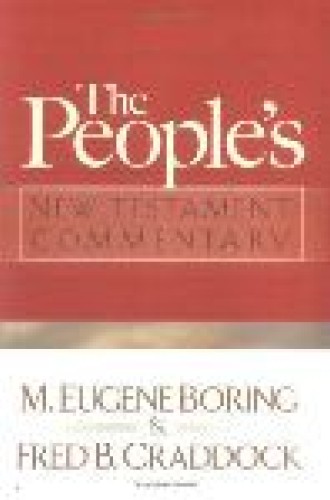Blind spots
Eugene Boring and Fred Craddock have endeavored to remake Barton Warren Johnson’s The People’s New Testament with Notes, a classic of the Disciples of Christ movement, for today’s church. The Disciples movement began with a protest initiated by Thomas Campbell in the early 19th century. Campbell’s core claim was that if the followers of Christ would go back to the Bible and the earliest vision of the church, especially as it appears in Acts and Paul’s letters, there would be a blessed unity among Christians. Boring and Craddock’s confident, plain-sense phrasing, their use of intratextual interpretation, and their openness and nondogmatic spirit stem from this denominational or, perhaps better said, restorationist ideology. The underlying premise is that if we just get out of the way, the Christian church will be happier and healthier, made whole by reading the New Testament and restored by its ancient kerygma.
The People’s New Testament Commentary highlights neither the “fruits of scholarship” nor the recognized competence of the interpreters as its basis for authority. Boring and Craddock have effectively hidden the typical signs of their great scholarship and the traditional patterns of scholarly authority, producing a gentle, even text that flows from comment to excursus and back. Yet their scholarship remains, creating confidence without being intrusive. They bring great comfort to readers by returning them to the text itself and privileging it over the work of the scholars.
I am completely comfortable recommending this one-volume commentary to anyone in my church. This is both my most positive assessment of the commentary and my strongest critique. I am not used to being comfortable in the world of the New Testament. I have become attuned to reading the text with a hermeneutic of suspicion and with a conscious regard for the deep contextuality of the reader and of the text. The distance between my sociopolitical context and that of the New Testament makes comfort seem like a dream. An awareness of the cultural bias of meaning and interpretation offers unlimited opportunity for me as preacher to renegotiate the text-and-meaning divide.
So I ask, where in this commentary is the liberationist reading of the parables or the literalist reading of Paul? Boring and Craddock comment on Mark 2:17: “The Markan picture of Jesus and the meaning of discipleship cannot be merely a biblical warrant for our own social ideologies, whether to the right or the left, but is upsetting to all efforts to read our own commitment into the text. Such reflections may open the modern reader to pursue more closely the understanding of discipleship implicit in the biblical text, rather than using the text as reinforcement for our own worthy causes.”
Here is the crux of the matter. Detachment has long been prized by the scholarly community, though it is now in question. The presence of spiritual-formation language renders articles too “biased” to be publishable in scholarly journals. Within the Disciples of Christ ideology that defines this commentary, detachment has morphed into an openness to hear the word in a pristine condition without a warrant to hear ourselves in the text. A passion for Christian unity and the universality of the word is the bias discovered here.
I believe, however, that it is precisely in our attachments that passion is engaged. It was in Luther’s passionate reading of the text that the Protestant movement began. It was in Wesley’s hearing of Luther’s passionate reading of Romans that my own Methodist movement began, with its own attachment to discipleship. It is in particularity with obtrusive attachments that the context of a reading finds its meaning.
For my church this evenly textured, neither hot nor cold, mainline commentary is perfect. I find nothing in it with which to disagree. In fact, I agree in principle with the comment on every text I check or use. I sincerely appreciate the way Boring and Craddock have nuanced passages, like Romans 1:26-27, that are difficult for the mainline church today.
This commentary does not demand that I change, but simply offers the text. It does not reek of partisanship but finds the middle ground. I believe that most mainline churches, including mine, will want this commentary in their libraries, and pastors who think and look like me will recommend it with confidence to parishioners. Is that a good thing?





